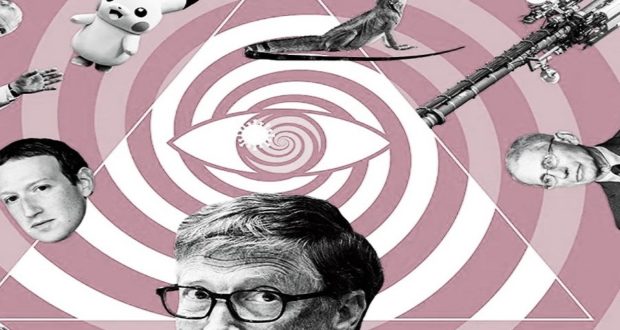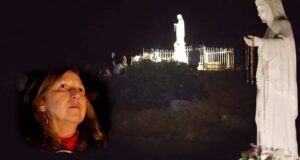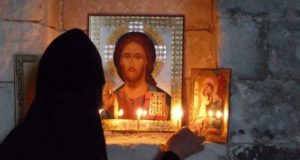أحد الجوانب الضئيلة ولكن المُرضية لظاهرة كوفيد هو عدد المعلقين الذين أثاروا اعتراضات شديدة عليها. لقد انضم الكثيرون إلى ذلك وهو يتردد في ذكر أي منها خوفًا من إهمال الآخرين ظلماً. هذا مثال حيث كان الإنترنت من الناحية التاريخية مساعدة فريدة لأولئك الذين ربما شككوا في سلامتهم العقلية.
أحد أفضل الاعتراضات هو شريط فيديو بعنوان العلمانية الشريعة للمعلق الأيرلندي ديف كولين. يشير السيد كولين إلى “Covid Cult” ، وهي طريقة مفيدة لتأطير ارتداء القناع الوسواس ، والتباعد الاجتماعي ، وغسل اليدين المرتبط بهذه الظاهرة. يصف كيف تعمل هذه الأفعال كدين ، وهو منظور ربما أقل مناقشة مما قد يكون. فيما يتعلق بالآثار غير الإنسانية لظاهرة كوفيد ، يستخدم السيد كولين مصطلح “شيطاني”.
“الشيطاني” هو وصف دقيق للتجريد من الإنسانية الذي نراه حولنا. ربما لا يكون مصطلح “عبادة” في هذه الحالة قوياً بما يكفي. يمكن أن تشمل “عبادة” في اللغة الإنجليزية العامية أي مجموعة اجتماعية مسيطرة وغير شخصية. يشار إلى الشيطاني بقوة أكبر بكلمة ذات صلة ، “غامض”.
علينا أن نعترف بأن ظاهرة كوفيد يمكن أن تكون غامضة. ماذا فعلت؟ فقد أغلقت الرعايا والمدارس الدينية ، وحرمت المؤمنين من الأسرار ، وأثبطت حضور الكنيسة بشكل عام.
كما أنه يعذب الناس. إنه يعذب كبار السن بحرمانهم من الاتصال بالعائلة والأصدقاء ، في الموت كما في الحياة. فكر فيما يجب أن يتوقعه الشخص المحتضر في جنازته ، مع العلم أن القليل منهم سيحضر. كما أنه يعذب الصغار الذين ، على عكس الكبار ، ليسوا في خطر محسوس. إنه يلوي أولئك في منتصف العمر ، المسؤولين عن تطبيق قواعد كوفيد ، إلى عملاء لهذا التعذيب.
يجب أن يكون مشهد جماعة ملثمة في خدمة كاثوليكية كافياً لتحفيز مثل هذه الأفكار. على الرغم من اقتراب معدلات الوفيات من عدم الأهمية الإحصائية ، فإن المصلين يشوهون وجههم في حضور الله. دوافعهم الذاتية غير ذات صلة إلى هذا الحد – الفعل مرئي. يتم تشويههم بشكل جماعي في العبادة ، وهي طقوس تتوقع اليوم الذي سنرى فيه الرب “وجهاً لوجه”. (1 كو 13:12).
يمكن قول هذا دون نية الإساءة أو الإهانة. مرة أخرى ، لا يغير الدافع الذاتي للمقنعين الطبيعة شبه السرية لعملهم. بحسب التعليم المسيحي للكنيسة الكاثوليكية ، الفقرة. 1670 ، الأسرار هي علامات “لا تمنحنا نعمة الروح القدس بالطريقة التي تعمل بها الأسرار ، ولكن بصلاة الكنيسة ، تهيئنا لنيل النعمة وتدفعنا للتعاون معها”. طلبت الكنيسة أو شجعت الأقنعة والأفعال الأخرى المرتبطة بظاهرة كوفيد – التباعد الاجتماعي ، وعدم الاتصال ، وعدم الغناء ، وما إلى ذلك – في العديد من الأماكن. بمجرد أن تدعم السلطة الكنسية هذه الأعمال ، فإنها تصبح علامات على الحياة الروحية الكاثوليكية. هل هذه العلامات الخاصة تهيئنا لنيل النعمة وتدفعنا للتعاون معها؟ من يستطيع أن يقول أنهم يفعلون؟
الحقيقة المحزنة لظاهرة كوفيد هي رد الفعل المتباين لكل هذا. يرتدي العديد من المؤمنين الأقنعة في الكنيسة ويمارسون العلامات الأخرى المرتبطة بالظاهرة بإخلاص وحتى بمحبة. من الواضح أنهم لا يشعرون بالاشمئزاز الذي يشعر به زملاؤهم الكاثوليك من رؤية نفس العلامات.
إذا كانت الكنيسة شبكة لكل أسماك البحر ، كما هي ، فكيف يمكن للسلطة الكنسية أن تطلب أو حتى تشجع مثل هذه العلامات المثيرة للانقسام؟ كانت عبارة “الانقسام من الشيطان” عبارة شائعة في دوائر الكنيسة. ما الذي يمكن أن يكون أكثر إثارة للانقسام من طرد الناس من الرعايا والمدارس الدينية ، وفصلهم أثناء الخدمة ، وتغطية نصف وجوههم حتى لا يمكن رؤيتهم بصعوبة وسماعهم فقط؟
سيكون التأثير مختلفًا إذا تم السماح فقط بالأفعال المرتبطة بظاهرة كوفيد ، ولم يتم طلبها أو تشجيعها. اعتاد الكاثوليك على التنوع في القداس – “هنا يأتي الجميع” ليس سخرية بالنسبة لنا بل تفاخر. إذا رغب البعض في مواصلة هذه الأعمال لأسباب صحية أو مجاملة ، فستصبح بالنسبة لهم مسألة اختيار شخصي ، وليس طاعة للسلطة الكنسية.
لسوء الحظ ، فإن السلطة الكنسية هي بالضبط ما يغير أفعالهم من عادات إلى علامات. كعلامات ، فهي خطيرة. يمكننا أن نأمل أنه سواء استعادت الحكومة عقلها أم لا ، فإن الكنيسة ستفرض قريبًا علامات النعمة فقط.
The Covid Occult
A slim but gratifying aspect of the Covid phenomenon is the number of commentators who have raised strong objections to it. So many have joined in that one hesitates to mention any for fear of unjustly omitting others. This is an instance where the internet has been a historically unique aid to those who otherwise might have doubted their own sanity.
One of the better objections is a video entitled Secular Sharia by the Irish commentator Dave Cullen. Mr. Cullen refers to the “Covid Cult,” a helpful way of framing the obsessive mask wearing, social distancing, and hand washing associated with the phenomenon. He describes how these acts function as a religion, which is a perspective perhaps less discussed than it might be. With specific regard to the dehumanizing effects of the Covid phenomenon, Mr. Cullen uses the term “demonic.”
“Demonic” is an accurate description of the dehumanization we see around us. The term “cult” in this instance is perhaps not strong enough. A “cult” in vernacular English can include any controlling, depersonalizing social group. The demonic is more strongly indicated by a related word, “occult.”
We have to acknowledge that the Covid phenomenon could be occult. What has it done? It has shut down parishes and religious schools, denied the sacraments to believers, and discouraged church attendance generally.
It also tortures people. It tortures the old by depriving them of contact with family and friends, in death as well as life. Think of what a dying person must anticipate of his or her funeral, knowing that few will attend. It also tortures the young, who, unlike the old, are not in appreciable danger. It twists those in middle age, who are responsible for implementing the Covid rules, into agents of this torture.
The sight of a masked congregation at a Catholic service should be enough to prompt such thoughts. Despite death rates approaching statistical insignificance, the congregants distort their visage in the presence of God. Their subjective motivation is irrelevant to this extent—the act is visible. They are collectively defaced in worship, a ritual which anticipates the Day when we shall see the Lord “face to face.” (1 Cor. 13:12).
This can be said without an intent to abuse or insult. The subjective motivation of the masked, once again, does not change the quasi-sacramental nature of their act. According to the Catechism of the Catholic Church, para. 1670, sacramentals are signs which “do not confer the grace of the Holy Spirit in the way that the sacraments do, but by the Church’s prayer, they prepare us to receive grace and dispose us to cooperate with it.” The Church has demanded or encouraged masks and other acts associated with the Covid phenomenon—social distancing, no contact, no singing, etc.—in many places. Once these acts are supported by ecclesiastical authority, they become signs of Catholic spiritual life. Do these particular signs prepare us to receive grace and dispose us to cooperate with it? Who could say they do?
A sad fact of the Covid phenomenon is the disparate reaction to all this. Many believers wear masks in Church and practice the other signs associated with the phenomenon dutifully and even lovingly. They apparently do not feel the revulsion their fellow Catholics experience on seeing the same signs.
If the Church is a net for all the fish of the sea, as She is, how can ecclesiastical authority demand or even encourage such divisive signs? “Division is from the devil” has been a popular catchphrase in Church circles. What could be more divisive than driving folks from parishes and religious schools, separating them during services, covering half their face so they can hardly be seen and only with difficulty heard?
The impact would be different if the acts associated with the Covid phenomenon were merely allowed, not demanded or encouraged. Catholics are used to diversity at Mass—”here comes everybody” is for us not a sneer but a boast. If for reasons of health or courtesy some wished to continue these acts, it would become for them a matter of personal choice, not obedience to ecclesiastical authority.
Unfortunately, ecclesiastical authority is precisely what changes their acts from habits into signs. As signs, they are dangerous. We can hope that, whether or not the government regains its sanity, the Church will soon impose signs only of grace.
 Agoraleaks Agoraleaks
Agoraleaks Agoraleaks







